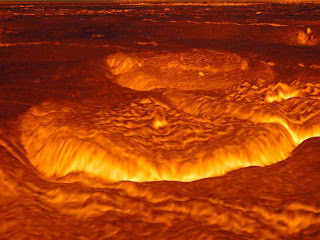

Earth's evil twin has been in the news recently after an amateur astronomer noticed a bright spot in its atmosphere.While scientists have been scratching their heads over it, the main culprit is thought to be a huge volcanic eruption on the planet's surface.Somewhat on a tangent, Venus was where my favourite case of unlucky science ever occurred.Back in 1981, the Russians sent over Venera 14 to sample the planet's soil using a spring-loaded arm with a sensor on the end.Having made it to the surface, not the simplest feat, the probe unfurled the sensor and then happily relayed back the chemical composition of... a plastic lens cap that had fallen off the ship.
The Russians had gone 24 million miles to measure the chemistry of something that was made a couple of hundred miles away from mission control.Ouch!!Venus is, of course, Earth gone bad.How bad?
Here's a Weird Science Factoid Special to get your chops around:
The surface temperature of Venus is over 480 degrees C (900 degrees F).
The atmospheric pressure on the surface of Venus is that 90 times the pressure on Earth.If you were able to stand on the surface of Venus, it would feel like being one kilometre under the sea on Earth, a depth deep enough to sink a submarine.
The clouds of Venus are filled with sulfuric acid. You don't want to be around when it starts to rain.Venus rotates so slowly that it orbits the sun faster than it can make one whole rotation on its axis. In other words, Venus has a longer day (243 'Earth days') than year (224 days).
Venus and Mercury are the only two planets in the Solar System not to have a moon.It is believed that Venus used to have bodies of water similar to Earth, but dried up over a period of 300 million years when the sun began admitting more solar energy after the sun's infancy stage.
Venus has mountains that are higher than Earth. Maat Mons is more than five miles high.The planet rotates from East to West. The only other planet that does this is Uranus.Venus would have a cold climate if it weren't for the high concentration of carbon dioxide in its atmosphere (96 per cent).
After the Sun, the Moon and now the International Space Station, Venus is the brightest object in the night-sky from Earth.Venus' axis hardly has any tilt at all, unlike Mars and Earth. This means that, if it had a thin atmosphere, the planet would not have seasons.There are more volcanoes on Venus than on any other planet in the Solar System.Venus may now resemble what Earth will become in millions of years time, when the Sun expands and turns the heatup. Let's get out of here!

Venus? Here's what I know...
ReplyDeletehttp://topfiveawesome.blogspot.com/2011/04/top-5-nearest-planets-from-sun.html